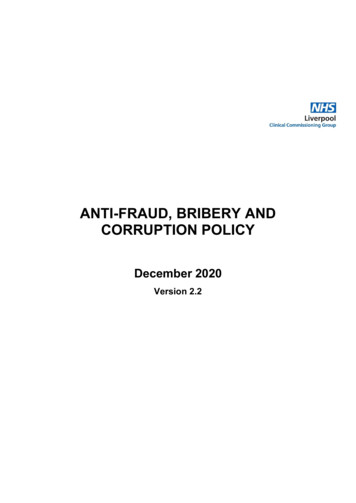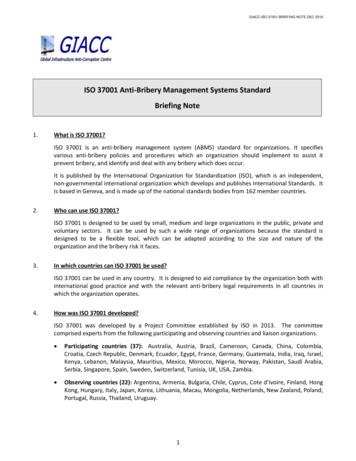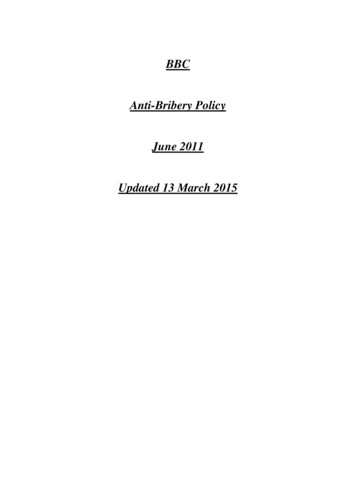What Is Wrong With Bribery? How, If At All, Should The Law .
What is wrong with bribery? How, if at all, should the law deal with it?The concept of bribery is deeply rooted in human history, echoing back to the earliest structures ofcivilisation1, yet never before has it been a topic of greater relevance. With politics embracing ourlives more snugly than ever before, the civil service’s increasingly widespread influence and theprogressed relevance of government decisions to the average citizen in the modern era, concern overcorruption has become universally pertinent over the last few centuries, and indeed, the last decade.With all its negative connotations, there are a myriad of reasons as to why bribery is undesirable; itundermines institutional authority, values of equality, and, particularly if commonplace, retardssocioeconomic progress. Notorious for being insufficiently investigated2 and punished, the impact ofbribery occurring at the highest levels of authority has undoubtedly had global repercussions. Thisessay will outline the immorality of bribery and its tangible consequences and argue that the only wayto comprehensively inhibit the crime is to adopt a firm stance in which the entity accepting the bribereceives stricter repercussions.Before the problems surrounding bribery can be outlined, the term must first be properly defined toprovide an adequate framework for analysis. In its looser, colloquial usage, bribery can beextrapolated to even the most ordinary situations where an incentive is offered. The distinctionbetween its familiar usage and the definition of bribery as it should be through the lens of the law,then, comes when the lure is motivated by personal gain, involves an abuse of power, or if it has, evenindirectly, a victim. These factors help to isolate unlawful bribery from its broader sense. Perhaps themost versatile definition of bribery, offered as a “working definition” by Stuart P. Green, is asfollows:Taylor, Clare. “Bribery in Athenian Politics Part I: Accusations, Allegations and Slander.” Greece & Rome 48,No. 1 (2001). 53-66.2Refer to the findings of https://www.transparency.org/exporting corruption, where 20 countries who produce20.5% of the world’s exports are listed to have “little or no enforcement” against foreign bribery.11
X (a bribee) is bribed by Y (a briber) if and only if: (1) X accepts, or agrees to accept, somethingof value from Y; (2) in exchange for X’s acting, or agreeing to act, in furtherance in someinterest of Y’s; (3) by violating some duty of loyalty owed by X arising out of X’s office,position, or involvement in some practice.3It is this definition of bribery that will be adopted; what makes it so favourable is because where manylegal parameters of bribery are limited to government officials, under this definition, bribes that occurin separate organisations, such as educational institutions’ admissions processes, are not overlooked.Furthermore, its clarity succeeds in encompassing the vast majority of situations that would beconsidered corrupt conduct by those in positions of power, and therefore preventing bribery under thisdefinition would be aptly geared towards creating the “sort of society we should live in”; a conceptthat, according to McBride, is one of the primary aims of law-makers4. Overall, the precision of theabove-stated definition facilitates a close consideration of what exactly is wrong with bribery, from itsethics to its consequences.One of the most significant reasons as to why bribery must be regarded as wrongful is because of themoral transgressions of the act. At its core, bribery ignores and bypasses rules embedded within thestructure of our society. This is ethically dubious as society relies upon rules to function: these are inplace to create stability, prevent anarchy and promote safety, leading to an inclusively betterenvironment for humans to live in. At an administrative level, these regulations create efficiency,order and reduce instances of abuse. Whether it is morally suspect to not always follow the rules laiddown by higher authorities is a separate ethical dilemma entirely, however, there is a consensus that tobreach these rules for the sake of self-interest is morally wrongful because it unjustly undermines theauthority of systems in place to prevent harmful conduct. Moreover, the fact that bribery assumes alevel of personal detachment and elevation from these universally applicable rules can be argued to beSee p.145 of: Green, Stuart. “What’s Wrong with Bribery.” In Defining Crimes: Essays on The Special Part ofthe Criminal Law, edited by A Duff, 143-167. Oxford University Press, 2005.4McBride, Nicholas. Letters to a Law Student, Fourth Edition. Harlow: Pearson, 2018.32
unethical; such an attitude inevitably influences one’s view of the law and undercuts its jurisdiction.By biasing the decisions of authority figures, bribery consequently destabilises their legitimacy. Thisis especially deleterious when bribery involves public officials, as this has the capacity to polarise thegeneral population from administrative entities, stirring a mistrust entirely counterproductive to therole of a government.The unethical nature of bribery is further highlighted through involving the betrayal of a duty ofloyalty: to accept a bribe is a violation of the power originally entrusted to the bribee, and therefore allpacts are subject to a substantial level of immorality. Another significant issue with bribery is that itinvolves elements of theft. When the entity being bribed acts to further the interests of theirbenefactor, it often involves selling a service that is not within their rights to control, and thus itfollows that that service is purloined at the expense of their organisation; this essentially amounts to aform of stealing. An example to illustrate this is if a public official is bribed by a company forsubsidies: as the subsidies are paid using taxpayer’s money, the official would be stealing the fundsand outsourcing the costs to the government. As stealing for individual convenience is ubiquitouslyregarded as immoral, this extends to the act of bribery.The pragmatic repercussions of bribery are equally as severe. Bribery itself wastes resources, and theWorld Bank estimates that the equivalent of 1 trillion is offered in bribes every year5. Additionally,corruption generally inhibits social and economic development, and bribery is no exception as aproponent of this. Through the use of measurements such as the Corruption Perceptions Index,numerous investigations have been able to prove the detriments of corruption. Statistically, it isestimated that an increase in 1 standard deviation of corruption decreases economic growth by about5%, and that a 1% increase in police corruption has the capacity to reduce the GDP per capita by0.6%6. Higher levels of corruption are also strongly correlated with poorer service delivery and weakgovernance. Even “generally virtuous”7 countries are not exempt from the crime, but this worst affects5See: ystem/uploads/attachment ruption-matters.pdf7See: eware-bribery-corruption-brexit63
countries in the developing world: according to a BBC article, “seven out of nine of the countries withthe highest reported bribery rate are in sub-Saharan Africa”8. The fact that bribery is most damagingto newly emerging economies by hindering their development indicates a global concern, as humanityas a whole would surely benefit if their progress was unobstructed and they could modernise morerapidly. Therefore, the economic consequences of bribery frame it not only as a social or moralconcern, but as a holistic obstacle that poses a genuine threat to the future prosperity of countriesacross the world.With all of the issues associated with bribery, the question of whether the law should deal with it canconfidently be a resounding yes. Combating corruption falls plainly within the general public’sinterests: as stated by Clarke, a previous UK secretary of state for justice, “bribery blights lives”9.How this should be done, however, demands a less transparent answer for its complexity. A primaryjudgement to establish is whether the crimes of each party should be handled with equal severity. Atleast two entities are involved in every bribe, yet arguably there is a juxtaposition in the moral gravityof the roles. As the bribee breaks a duty of loyalty inherent to the position of trust they occupy, itseems logical that they should be punished to a greater extent: if they are a member of the civilservice, it is their actions that ultimately determine their capacity to erode the relationship between thestate and its representatives, or otherwise harm the legitimacy of the authoritative position theyoccupy. It is therefore proposed that, when the law convicts an individual, they should be immediatelyremoved from their position and barred from occupying ranks of similar authority for several years, ifnot the rest of their career, depending on the severity and implications of the crime. Whilst this couldpotentially be more difficult to enforce amongst private or foreign enterprises, this measure is mostsignificant for public offices where the government has the most control. A zero-tolerance policytowards members of the civil and health services must exist.89See: https://www.bbc.co.uk/news/business-23231318See: ribery-act-2010-guidance.pdfT4
Other consequences could be imposed, such as fines and community service. However, prisonsentences should only be extended to the most extreme of circumstances, as with the oversaturation ofprisons a growing concern as well as the fact that, despite the immorality of bribery, the crimeindicates no immediate danger to others, jailing appears largely unnecessary. The alternativeconviction of community service would be far more productive as a form of redemption, particularlygiven bribery’s indirect repercussions for the wider population. Otherwise, the full extent of the lawshould be utilised to disincentivise bribery, with person in the position of authority invariablypunished to a greater extent. Although this may at first seem draconian, it is the individual who takesa bribe is the one who perpetuates a culture of bribery that is so damaging to society as a whole.Moreover, a practical benefit of this measure is that people are more likely to report bribes if an entitymakes it conditional of their services, as they will know that the perpetrator will be appropriatelyreprimanded. The establishment of bribery as common practice that proves fatally debilitating to thestrength of governance: this measure would aid in preventing this.Coupled with this firm stance against bribery, it should be encouraged for legal systems across theglobe to adopt a more proactive role in dispelling foreign corruption. According to a report from theUK government10, “weak governance is one of the fundamental causes of corruption”. The countrieswho are most vulnerable to effects of bribery, then, are likely to be those not well-enough equipped toadmonish it themselves. With globalisation heightening the relevance bribery as a worldwidephenomenon, a strong international stance against corruption would create a climate in which briberyis intolerable. The intervention of supranational bodies with the capacity to instigate and supportthird-party corruption investigations, such as the UN, would also expedite the process of eliminatingbribery on a national as well as international scale.In conclusion, bribery is never a victimless crime. It removes opportunities and resources that impactlives in even the most benign instances. The moral faults, social harms and economic repercussions of10Refer to the aforementioned document in 65
bribery are compelling reasons for the law to deal with bribery, but critically, the most cogentargument for the government specifically is that in circumventing regulations, bribery threatens legalsystems themselves by undermining the authority of the rule of law. Furthermore, the potentialimpacts of bribery are severely disturbing; at the highest level, enabled by the digital age, bribes caneven threaten democracy itself by swaying paramount political decisions and intervening withelections. Legal systems must encourage more dynamic policies to suppress such activities. The mostimportant measure to initiate this is to ensure that laws adapt their definition of criminal bribery tocomprehensively encompass unlawful situations; such reforms have been shown to be effective11.This, coupled with a firm stance against bribery and with new measures of international co-operation,there is no reason as to why it cannot or should not be tackled on a global scale. Bribery is wrong, andit is preventable. Legal systems should dedicate themselves to truly eradicate it.Word count, including footnotes: 199511See: y6
BibliographyBooks, e-Books and JournalsGreen, Stuart. “What’s Wrong with Bribery.” In Defining Crimes: Essays on The Special Part of theCriminal Law, edited by A Duff, 143-167. Oxford University Press, 2005.Holmes, Leslie. Corruption: A Very Short Introduction. Oxford University Press, 2005.McBride, Nicholas. Letters to a Law Student, Fourth Edition. Harlow: Pearson, 2018.Taylor, Clare. “Bribery in Athenian Politics Part I: Accusations, Allegations and Slander.” Greece &Rome 48, No. 1 (2001). 53-66.Government PublicationsThe Bribery Act 2010 – Guidance by the Ministry of ation/bribery-act-2010-guidance.pdfWhy corruption matters: understanding causes, effects and how to address them by the Departmentfor International Development ernment/uploads/system/uploads/attachment ruption-matters.pdfOnline Websites, Articles and Blogs (Each last accessed on April 15th, 2018)“Exporting Corruption 2018.” Transparency ng corruptionHBS Working Knowledge Anonymous Contributor. “The Real Cost of Bribery.” Forbes. November5, 2013. 013/11/05/the-real-cost-of-bribery/Inman, Philip. “Beware bribery and corruption in Brexit’s new world.” The Guardian. April 14, /14/beware-bribery-corruption-brexitWalton, John; Domfeh, Sophia and Shannon, Claire. “Which country pays the most bribes?” BBC.July 9, 2013. https://www.bbc.co.uk/news/business-23231318Read, Keith. “Bribery – The Reality.” Convercent. December 19, ealityEditors of Encyclopaedia Britannica. “Bribery.” Encyclopaedia Britannica. March 25, 2019.https://www.britannica.com/topic/briberyFox, Tom. “Why bribery is bad for business.” Compliance Week. February 13, from-fcpa/why-bribery-is-bad-for-business7
bribery occurring at the highest levels of authority has undoubtedly had global repercussions. This essay will outline the immorality of bribery and its tangible consequences and argue that the only way to comprehensively inhibit the crime is to adopt a firm stance in which the entity accepting the bribe receives stricter repercussions.
Bribery Act 2010, for offences committed on or after 1st July 2011. The Bribery Act 2010 reforms the criminal law of bribery, making it a criminal offence to: Give, promise or offer a bribe (s.1), and/or Request, agree to receive or accept a bribe (s.2). Corruption is generally considered to be an “umbrella” term covering such various activities as bribery, corrupt preferential treatment .
bribery risks associated with the conduct of their business. The supplier must undertake a regular anti-bribery risk assessment in order to identify and mitigate the bribery risks associated with the conduct of its business. The supplier must ensure that all risks identified are managed and mitigated by the application of its anti-bribery controls. Due diligence The purpose of due diligence is .
The Bribery Act 2010 – Quick start guide. 1. The Bribery Act 2010 modernises the law . on bribery. It comes into force on 1 July 2011. This document offers a quick guide to the things you need to know to prepare your business for implementation. The Government has also produced detailed guidance about the Act and the . procedures that organisations can put in place to prevent bribery, as .
ISO 37001 is an anti-bribery management system (ABMS) standard for organizations. It specifies various anti-bribery policies and procedures which an organization should implement to assist it prevent bribery, and identify and deal with any bribery which does occur. It is published by the International Organization for Standardization (ISO .
Bribery Podbriefing Audio Transcript 00:03 The Bribery Act is the UK’s anti-corruption law. It introduces a range of offences to tackle corruption, and affects both individuals and organisations, in both the private sector and in public sector context. 00:31 What people often think about bribery is a payment in cash or financial advantage, but a bribe can be many things. It can be excessive .
bribery and corruption and implications of an investigation. It is not intended to detail a comprehensive approach to preventing and detecting fraud, bribery and corruption. Issue Date: Page 6 of 21 Document Name: Anti-Fraud, Bribery and Corruption Policy Version No: 2 Definitions . The definitions applicable to this policy are as follows: 2.1 NHS Counter Fraud Authority . The NHS CFA is a new .
countering bribery and corruption in all the jurisdictions in which we operate. In particular, we are committed to compliance with the Bribery Act 2010, in respect of our conduct both at home and abroad. The Bribery Act 2010 applies to individuals and all organisations carrying on a business in the UK, including the broadcasting sector. The territorial jurisdiction of the prosecutors extends .
n ISO 37001 cannot provide absolute assurance that no bribery will occur. But can help establish that organization has implemented reasonable and proportionate anti-bribery measures. n The risk of bribery is reduced and the playing field is levelled for organizations if certification to ISO 37001 is a project pre-qualification requirement.























